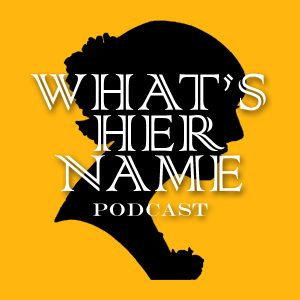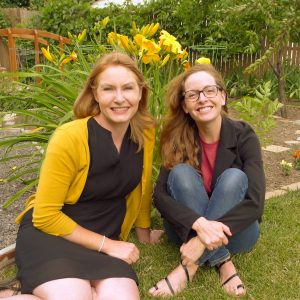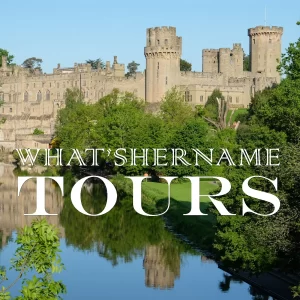Talking About Women’s History: Three Questions (or Four, or six–depending on how you count) and an Answer with Katie Nelson and Olivia Meikle
If you’ve been hanging out here on the Margins for a while, you’ve probably read an earlier interview with women’s history co-conspirators Katie Nelson and Olivia Meikle, a pair of sisters who just keep finding new ways to explore women’s history and take the rest of us along with them. They are the hosts of the What’s Her Name podcast and co-authors of The Book of Sisters. (Rumor has it that they have a couple of new books in the works: A Stinky History of Toilets (coming soon) and A History of the World in 70 Lost Women.
Katie Nelson has a PhD in History from the University of Warwick and taught World History, Study Abroad, and The Meaning of Life at Weber State University for a decade. After diving into local history as Executive Director of the Weber County Heritage Foundation, she now writes books, leads tours, and podcasts full-time. Katie loves trying ALL the foods, exploring life’s big questions, and curating travel adventures for curious folks.
Olivia Meikle teaches Women’s & Gender Studies at Naropa University. She’s also the author of Around the World in 80 Diapers, a website empowering parents to travel internationally with their kids. She has an MA in English Literature and Women’s & Gender Studies from the University of Colorado, Boulder.
It seems like every year you add a new and exciting way to explore fascinating women who have been left out of the historical narrative. Women’s history tours are the latest addition to the What’s Her Name empire. What inspired you to take this new step in women’s history?
Katie: I taught Study Abroad at Weber State University for a decade, guiding students across Europe. It was one of the great privileges of my life to witness the transformative power of educational travel through my students, year after year. I started recording podcast interviews on the fly while I was abroad; I was just encountering so many interesting stories! After more and more listeners kept saying things like “one day I want to visit the place where you recorded that episode…”, the next step was clear. We needed to create a new kind of study abroad, for curious grown ups. Our tours are built around episodes we’ve recorded, and rooted in authentic human connection (“don’t be hurry up”). We really get a self-selecting group of adventurers. If I say, “would you like to travel to obscure places no one knows about, to learn about women no one’s ever heard of?” The lovely, wonderful people who answer heck yes! are our people.
Once you’ve chosen the main destination, say Mexico, is it hard to find women-centric places to include on the tour?
Katie: Not at all, but I think it’s because we’ve learned where and how to look…i.e., not in the usual guidebooks, and not in the usual destinations. It turns out, the trickiest thing is trying to convey to hotels, drivers, and other guide-types that no, in fact, we do NOT want an itinerary that’s exactly like all the other commercial tours. Yes, we really do want to take a group to this obscure spot no one else cares about. We don’t fit any tourist stereotypes. Tourism professionals don’t know what to do with us. Which is how I like it! We have to be our own travel agents.
Olivia: Adding on to Katie’s answer: That’s actually one of my favorite things about our tours! There’s something magical about seeing all these ‘jaded, tourist-weary travel professionals’ we’re working with – drivers, site guides, hotel staff, etc – go from baffled, to amused, to intrigued, to absolutely, totally delighted as they watch our select little groups dive wholeheartedly into these totally unique (and undeniably odd) adventures. Most of the time they end up ‘diving in’ with us, becoming an integral part of the group on our weird little sidetracks off the tourist map, discovering new hidden treasures in their own backyards, and having as much fun as the rest of us. It’s such a joyous thing to experience, and I’ll never get tired of it.
What do you find most challenging or most exciting about researching historical women?
Katie: I love finding kindred spirits across time and across the world. Every once in a while, I’ll discover a women I instantly connect to. Even if she lived centuries ago in a completely different cultural world, I feel a profound kinship. Emilie du Chatelet, May Alcott, Zazil-Ha, Bouboulina…I found all of them through the podcast. Somehow the human story becomes my story, and vice versa–we’re all in it together.
Olivia: The answers to both these questions are kind of the same – I’m always amazed seeing how many women overcame incredible odds to accomplish the things they wanted to do! And seeing their courage and determination, and absolute refusal to give in to the obstacles and the forces trying to stop them, is never-endingly inspiring. But the flip side of that is this: it’s often incredibly disheartening to recognize so many of those exact same obstacles still working against women today, in exactly the same ways they were 100 or 700 (or 1700…) years ago. Reading about the obstacles placed in the way of a 16th century Afghani woman’s goals, then turning on the TV to see those exact same roadblocks popping up again in 2023 America can feel a bit depressing, to say the least.
But lately I find myself returning often to a quote from my favorite “hometown heroine” from my little Colorado mining town, 20th century Labor Activist (and first female Assistant Secretary of the Treasury in the US!) Josephine Roche: “If you believe in something, you may have to take a beating for many years before you accomplish your goal.” Roche certainly did that, for many, many years. But after all those years of struggle, she truly did revolutionize workers’ rights in this country forever. And so (at least most days) I still really do believe: If she [all these incredible, unstoppable “Shes” of history] can do it, then so can I.
What work of women’s history have you read lately that you loved? (Or for that matter, what work of women’s history have you loved in any format? )
Olivia: There were a couple of new books this year that absolutely blew my mind – Keith O’Brien’s brilliant and infuriating Paradise Falls, on the history of the Love Canal Disaster in the 1970s, was one I’d been eagerly anticipating for months but it was even more mind-blowing (and heart-wrenching) than I’d expected, and the amount of new information he was able to dig up on one of the stories I’ve been mild-to-moderately obsessed with for 20+ years was astonishing.
Then another book which just came out last month that I absolutely loved is Carolyn Whitzman’s Clara at the Door with a Revolver. A glorious deep-dive history of a “cross-dressing, maybe-bisexual, working class, Black woman tailor” put on trial for the murder of her well-to-do white male neighbor – in 1894! Fascinating, unexpected, extremely thought-provoking and incredibly well written, this book was a wild WILD ride of the best kind. I’d lined up an interview with the (absolutely delightful) author for the podcast before I’d even finished the book, because it was so obvious that this story was going to be one we simply had to share.
What do you find most challenging or most exciting about researching historical women?

A question from Katie and Olivia: Is there any particular site/location from women’s history that you dream to see someday?
I may be the only person in the world who has this on her bucket list: The Gene Stratton Porter historic site in Indiana.
I got a copy of one of her novels when I was nine or ten. I don’t remember if I bought it myself or if it was a quirky birthday present from someone. I fell hard for the story. It remains my favorite of her books. I re-read it every year or so.
The more I learn about her, the more amazing she is. She was a best-selling novelist in the early twentieth century, an early conservation activist, and one of the first women to form a movie production company.
We have driven past the signs for the historic site several times, but we’ve never been able to stop. One of these days we’ll make it.
Want to know more about Katie Nelson and Olivia Meikle and the amazing work they do?
Listen to the podcast: https://www.whatshernamepodcast.com/
Follow them on Twitter: @WhatsHerNamePC
Follow them on Facebook: https://www.facebook.com/whatshernamepodcast
Follow them on Instagram: https://www.instagram.com/whatshernamepodcast/
* * *
Come back tomorrow for three questions and an answer with biographer Diana Parsell







Pam, I would love to see Gene Porter Stratton site! I found her books fascinating. So, if I ever make it to Indiana…
Good to know someone else knows her books!